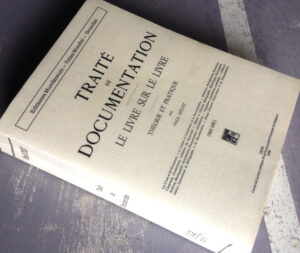Revisando hace unos días lecturas para una ponencia, encontré de nuevo un texto ya clásico de Michael Buckland, en el cual, hace una docena de años, reflexionaba sobre el concepto de documento. La referencia completa es Buckland, Michael (1997): «What is a document?» Journal of the American Society of Information Science 48, 9: 804-809.
Del contenido del mismo he querido extraer un par de párrafos significativos:
«There are numerous writings on the definition, scope, and nature of «documentation», much of it concerned with the relationships between documentation, bibliography, and librarianship. Unfortunately, many of this literature, like much of the later discussion of information science and librarianship, is undermined by the authors’ attempts to create or amplify distinctions where the differences are not really fundamental but, rather, a matter of emphasis.»
«One difference between the views of the documentalists discussed above and contemporary views is the emphasis that would now be placed on the social construction of meaning, on the viewer’s perception of the significance and evidential character of documents. «Relevance», a central concept in information retrieval studies, is now generally considered to be situational and ascribed by the viewer.»
Esto ya lo escribía Buckland en 1997… nunca he creído que la división tradicional española entre biblioteconomía, archivística y documentación vaya realmente más allá de la especificidad de algunas técnicas en un contexto particular, de la misma forma que nunca me he creído que la relevancia sea un indicador especialmente importante para reflejar la satisfacción del usuario ante la información que recibe durante un proceso de búsqueda.
Al año siguiente, Buckland publicaba en Document Numérique una actualización del texto, prestando más atención a los aspectos digitales del concepto: Buckland. Michael (1998): «What is a digital document?» Document Numérique 2, 2: 221-230:
«If we sustain the functional view of what constitutes a document, we should expect documents to take different forms in the contexts of different technologies and so we should expect the range of what could be considered a document to be different in a digital and paper environments.»
«Attempts to define digital documents are likely to remain elusive, if more than an ad hoc, pragmatic definition is wanted. Definitions based on form, format and medium appear to be less satisfactory that a functional approach…«
Y para completar la revisión, también es necesario reseñar el artículo de Schamber, Linda (1996): «What is a document? Rethinking the concept in uneasy times.» Journal of the American Society of Information Science 47, 9: 669-671, del que me permito extraer estas dos citas:
«Then consider a definition of document as a unit: Consisting of dynamic, flexible, nonlinear content, represented as a set of linked information items,stored in one or more physical media or networked sites; created and used by one or more individuals in the facilitation of some process or project.»
«Rethinking professional roles means adapting in order to provide updated products and services, and using new tools such as hypertext creation programs, hypermedia, automatic filters, navigation aids, and intelligent agents.»




